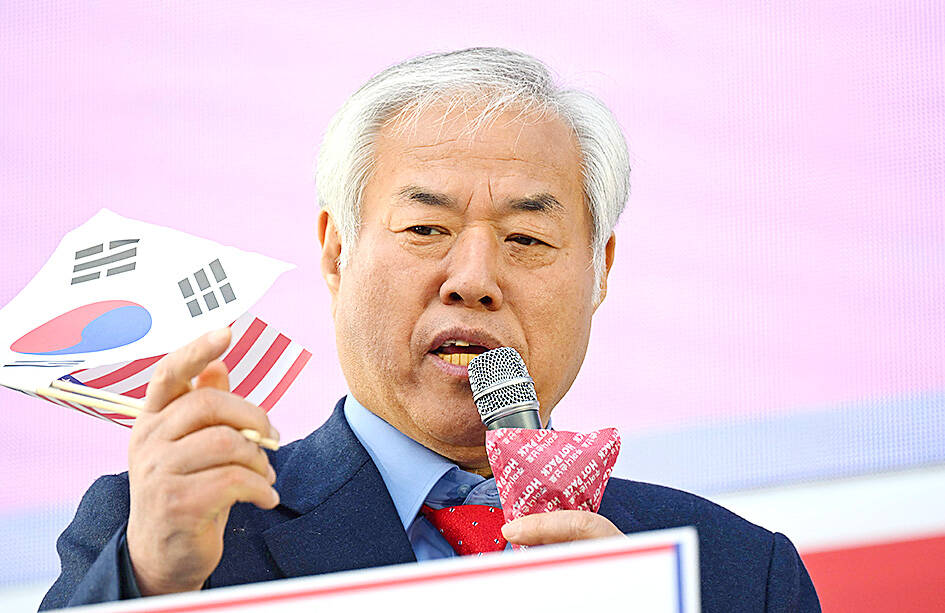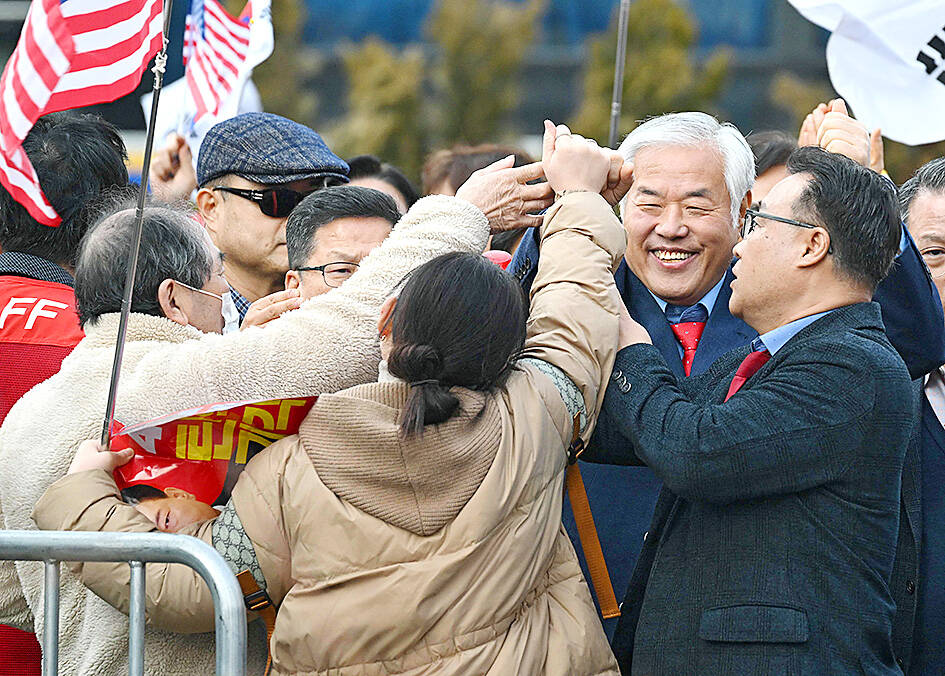If South Korea formally impeaches its suspended president over his martial law debacle, one firebrand pastor says he is ready for “revolution.”
Evangelical preacher Jun Kwang-hoon is one of President Yoon Suk-yeol’s most fervent defenders, calling Yoon’s Dec. 3 martial law declaration a “gift from God.” He has been prepping his followers to take action for weeks, and Yoon’s release from detention over the weekend on procedural grounds has turbo-charged 68-year-old Jun’s sermons.
“If the Constitutional Court decides (to impeach him), we will mobilize the people’s right to resist and blow them away with one blade swoop,” Jun told hundreds of supporters during a service held Sunday outside Yoon’s residence.

Photo: AFP
Authorities are so worried about the potential for violence when the Constitutional Court issues its ruling on Yoon this month that police have been granted special permission to use pepper spray and collapsible batons if his supporters get unruly.
They have cause for concern.
The pastor — long a fringe character on the extreme right edge of South Korean politics — has moved into the mainstream in recent weeks by taking to the streets as the disgraced president’s chief apologist.

Photo: AFP
“President Yoon started the cleansing with his declaration of martial law. The people and I will finish it together,” Jun said Sunday.
He claims North Korea is behind the country’s democratic opposition and has promulgated unfounded claims of widespread election fraud — all echoed by Yoon and his lawyers in their defense of martial law.
Jun is already under police investigation in connection to the storming of a courthouse in January, with two of his followers arrested at the scene.
Police said they will mobilise all resources to avoid a repeat when the Constitutional Court rules.
‘FOUND HIS FLOCK’
Experts say the pastor — best known for defying COVID-gathering limitations during the pandemic — has tapped into a previously marginalized far-right constituency that has expanded in the wake of Yoon’s martial law declaration.
Around a quarter of South Koreans are Christians, and Jun has “found his flock among the elderly underclass of South Korean society,” said Kim Jin-ho, a theologian and analyst.
His audience are “those whose values have been shaped by anti-communism but who have found little resonance in the prosperity gospel of mainstream conservative Protestantism,” Kim said, adding that the pastor has a knack for provocation, much like “an online conspiracy theorist.”
As a result, Jun has raised an unlikely coalition behind Yoon — older Koreans steeped in Cold War ideology and a young, mostly male cohort fluent in an Internet culture scornful of politics.
“Pastor Jun speaks for the people,” said 37-year-old Park Jun-seo Saturday at a pro-Yoon rally.
“He is the only one brave enough to speak truth to power.”
Seo Hui-won, in his 60s, said Jun was “fighting on the frontlines” of a war against communism. If Yoon is formally removed by the court, it would trigger an election in 60 days. As they confront the real possibility of a coming poll, even mainstream conservative politicians are eagerly jumping on Jun’s bandwagon.
Key figures from Yoon’s People Power Party have taken to the stage at Jun’s previous rallies, crediting the pastor and his supporters for creating momentum for a conservative revival.
Their association with the firebrand pastor helps them “gain a base of loyal voters,” said Jeon Sang-jin, a sociology professor at Seoul’s Sogang University. But for the country, this means that the pastor’s conspiracy theories, “once relegated to the fringes, have been legitimized by Yoon, the PPP and the far-right media,” Jeon said.
If upheld by the court, Yoon would become the country’s second president to be formally impeached.
Police are on high alert after riots broke out over the removal of Park Geun-hye from office in 2017.
Experts warn that Yoon — who remains under criminal investigation — appears to be seeking to whip up his hardline supporters.
Yoon had no choice but to “sacrifice himself and declare martial law” to purge the “worms infesting the country’s executive, legislature and judiciary,” lawyer Seok Dong-hyun told the huge crowds at one of the pastor’s protests.
Such rhetoric seems intended to help Yoon retain political influence even if his impeachment is ultimately upheld, said Lim Ji-bong, a constitutional law professor at Sogang University.
“This kind of messaging may provoke his supporters to reject the Constitutional Court’s verdict and incite another violent incident like the courthouse riot last month,” Lim said.
“This will not only undermine the country’s judicial system, but destabilize South Korea’s political foundation at its very core.”

April 14 to April 20 In March 1947, Sising Katadrepan urged the government to drop the “high mountain people” (高山族) designation for Indigenous Taiwanese and refer to them as “Taiwan people” (台灣族). He considered the term derogatory, arguing that it made them sound like animals. The Taiwan Provincial Government agreed to stop using the term, stating that Indigenous Taiwanese suffered all sorts of discrimination and oppression under the Japanese and were forced to live in the mountains as outsiders to society. Now, under the new regime, they would be seen as equals, thus they should be henceforth

Last week, the the National Immigration Agency (NIA) told the legislature that more than 10,000 naturalized Taiwanese citizens from the People’s Republic of China (PRC) risked having their citizenship revoked if they failed to provide proof that they had renounced their Chinese household registration within the next three months. Renunciation is required under the Act Governing Relations Between the People of the Taiwan Area and the Mainland Area (臺灣地區與大陸地區人民關係條例), as amended in 2004, though it was only a legal requirement after 2000. Prior to that, it had been only an administrative requirement since the Nationality Act (國籍法) was established in

With over 80 works on display, this is Louise Bourgeois’ first solo show in Taiwan. Visitors are invited to traverse her world of love and hate, vengeance and acceptance, trauma and reconciliation. Dominating the entrance, the nine-foot-tall Crouching Spider (2003) greets visitors. The creature looms behind the glass facade, symbolic protector and gatekeeper to the intimate journey ahead. Bourgeois, best known for her giant spider sculptures, is one of the most influential artist of the twentieth century. Blending vulnerability and defiance through themes of sexuality, trauma and identity, her work reshaped the landscape of contemporary art with fearless honesty. “People are influenced by

The remains of this Japanese-era trail designed to protect the camphor industry make for a scenic day-hike, a fascinating overnight hike or a challenging multi-day adventure Maolin District (茂林) in Kaohsiung is well known for beautiful roadside scenery, waterfalls, the annual butterfly migration and indigenous culture. A lesser known but worthwhile destination here lies along the very top of the valley: the Liugui Security Path (六龜警備道). This relic of the Japanese era once isolated the Maolin valley from the outside world but now serves to draw tourists in. The path originally ran for about 50km, but not all of this trail is still easily walkable. The nicest section for a simple day hike is the heavily trafficked southern section above Maolin and Wanshan (萬山) villages. Remains of